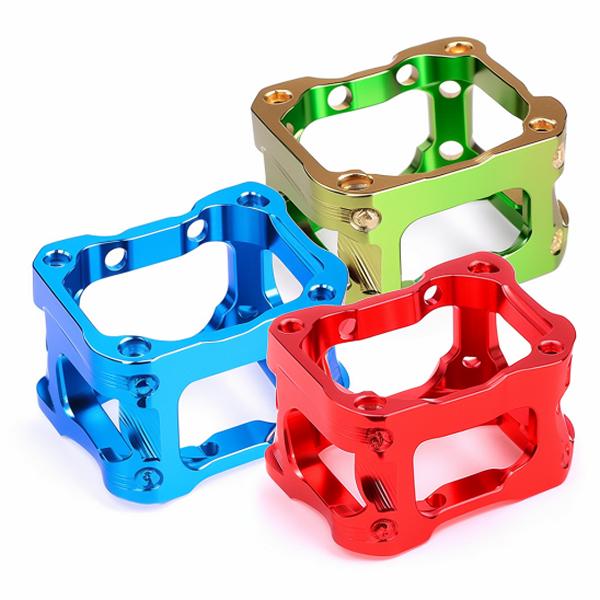The Single Strategy To Use For Alcast Company
The Single Strategy To Use For Alcast Company
Blog Article
The smart Trick of Alcast Company That Nobody is Talking About
Table of ContentsSee This Report about Alcast CompanyUnknown Facts About Alcast CompanyThe Basic Principles Of Alcast Company The 9-Second Trick For Alcast CompanyAlcast Company Can Be Fun For AnyoneAlcast Company Can Be Fun For Everyone
Chemical Contrast of Cast Aluminum Alloys Silicon promotes castability by reducing the alloy's melting temperature level and boosting fluidity during spreading. In addition, silicon adds to the alloy's strength and put on resistance, making it useful in applications where durability is crucial, such as automotive parts and engine elements.It likewise boosts the machinability of the alloy, making it much easier to process into finished products. By doing this, iron adds to the total workability of light weight aluminum alloys. Copper boosts electric conductivity, making it advantageous in electric applications. It additionally improves rust resistance and includes in the alloy's total stamina.
Manganese contributes to the stamina of light weight aluminum alloys and boosts workability (Casting Foundry). It is generally made use of in functioned light weight aluminum products like sheets, extrusions, and profiles. The visibility of manganese aids in the alloy's formability and resistance to cracking during manufacture procedures. Magnesium is a lightweight element that supplies toughness and influence resistance to light weight aluminum alloys.
How Alcast Company can Save You Time, Stress, and Money.
It allows the manufacturing of light-weight parts with superb mechanical homes. Zinc improves the castability of light weight aluminum alloys and helps control the solidification procedure during spreading. It boosts the alloy's strength and firmness. It is usually located in applications where complex shapes and great information are needed, such as decorative castings and particular automobile parts.

The main thermal conductivity, tensile stamina, yield strength, and prolongation vary. Among the above alloys, A356 has the highest thermal conductivity, and A380 and ADC12 have the most affordable.
Fascination About Alcast Company

In precision spreading, 6063 is appropriate for applications where complex geometries and high-quality surface finishes are paramount. Examples consist of telecommunication rooms, where the alloy's remarkable formability permits sleek and visually pleasing layouts while maintaining structural honesty. In a similar way, in the Illumination Solutions market, precision-cast 6063 elements create elegant and efficient lights components that require intricate shapes and excellent thermal efficiency.
It results in a better surface finish and far better rust resistance in A360. Additionally, the A360 exhibits remarkable elongation, making my explanation it excellent for complicated and thin-walled parts. In accuracy casting applications, A360 is well-suited for markets such as Consumer Electronic Devices, Telecommunication, and Power Tools. Its enhanced fluidity permits complex, high-precision elements like smart device housings and interaction tool housings.
The Basic Principles Of Alcast Company
Its special homes make A360 an important option for accuracy spreading in these markets, enhancing item durability and quality. Aluminum alloy 380, or A380, is an extensively made use of casting alloy with a number of distinctive qualities. It provides outstanding castability, making it a perfect choice for precision spreading. A380 displays good fluidness when molten, making sure elaborate and thorough mold and mildews are precisely recreated.
In precision spreading, aluminum 413 beams in the Customer Electronic Devices and Power Devices industries. This alloy's exceptional deterioration resistance makes it an exceptional option for exterior applications, making certain resilient, sturdy products in the mentioned industries.
The Greatest Guide To Alcast Company
The aluminum alloy you pick will considerably affect both the casting process and the buildings of the final product. Because of this, you have to make your decision meticulously and take an educated approach.
Establishing the most suitable light weight aluminum alloy for your application will suggest evaluating a broad array of attributes. These comparative alloy attributes adhere to the North American Pass Away Spreading Organization's standards, and we've split them right into two groups. The first classification addresses alloy attributes that affect the production procedure. The second covers characteristics affecting the homes of the end product.
A Biased View of Alcast Company
The alloy you pick for die casting directly affects several elements of the casting procedure, like just how very easy the alloy is to collaborate with and if it is prone to casting flaws. Hot fracturing, additionally referred to as solidification cracking, is a common die casting defect for aluminum alloys that can cause inner or surface-level rips or fractures.
Certain light weight aluminum alloys are a lot more vulnerable to hot breaking than others, and your option must consider this. It can harm both the cast and the die, so you need to look for alloys with high anti-soldering buildings.
Rust resistance, which is already a remarkable quality of aluminum, can vary considerably from alloy to alloy and is a crucial particular to consider depending on the ecological conditions your item will be exposed to (Foundry). Put on resistance is another residential property frequently sought in aluminum items and can distinguish some alloys
Report this page